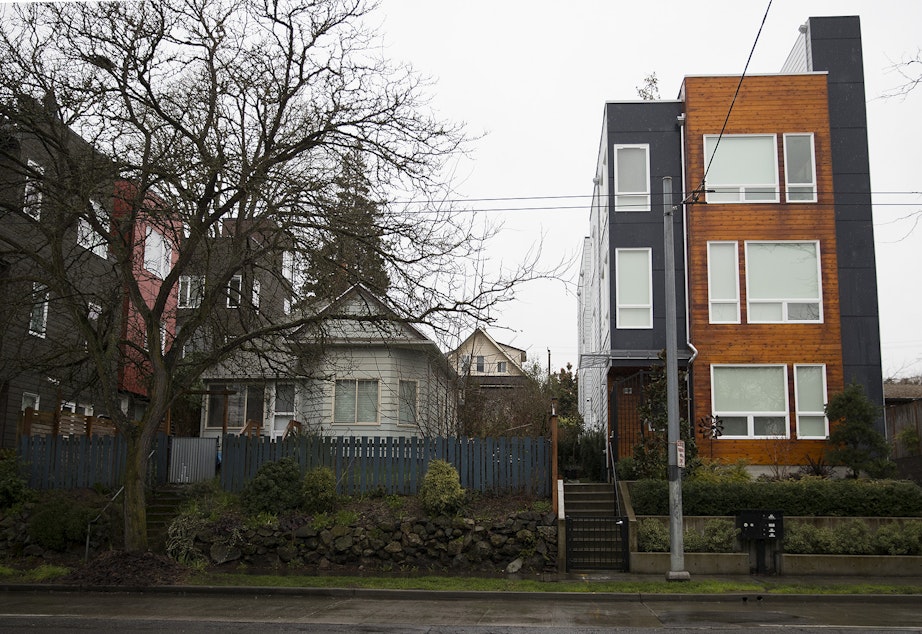'Are we going to really be able to prevent eviction?' Community groups brace for next housing crisis

There's more than $300 million in rental assistance available for renters and landlords before Washington state's eviction moratorium expires.
But the money has been so slow to reach eligible people in Seattle and across King County, community groups are bracing for another housing crisis.
Jeanice Hardy is dogged by a question this money was meant to answer: "Are we going to really be able to prevent eviction?"
Hardy is the YWCA's regional director of family and related services for King County. The YWCA — founded in 1894 as the Seattle Young Women’s Christian Association — is one of the community-based groups that have been working double-time to get some of the money into eligible pockets.
That work isn't just about gathering and filing paperwork.
(That's a big part of the confusion, though. You can read more from KUOW about what is required here.)
Hardy says she's on the phone with landlords all day, every day, "preaching" about why evicting a family in their own community is bad for everyone.
"We are facing a deadline," Hardy says. "We already have a homeless crisis. If we don't get this right, we haven't seen [how bad it could be]."
And that's because so many layers of bureaucratic red tape have been wrapped around the process that it's difficult to know where to begin, she says.
Hardy recently told Crosscut this process didn't have to be so difficult.
Sponsored
"There is a scarcity problem around whether people know where to go, who to call," she says. "So, what they're doing is just calling all over the place" and wasting the precious time they have to get help.
"Time is a-clickin'," she says.
And here's the thing: Hardy says the process is quite quick and easy once people conquer the logistics at the frontend.
So until then, some communities have come up with their own system of "bartering" and other creative ways to keep each other's heads above water.
For example, Hardy worked with a tenant who had a childcare arrangement with a neighbor. While one worked in the morning, the other watched both of their children. And when that person went to work in the evening, the early bird cared for the kids.
Sponsored
The arrangement allowed them both to keep working, to make money to pay rent and keep food on the table, without having to also pay for childcare — if they could have even found it.
"I speak to the African-American community, and we are relational people," she says, noting Black people and other people of color have been disproportionately affected by the pandemic.
"[Neighbors are working together] to move forward, keep their jobs, keep feeding their family and continue to try to stay closest to paying their rent as possible."
Hardy has been energized by this innovation and drive to take care of each other.
But she points out that by finding solutions outside of the bureaucracy, BIPOC communities have had to carry the burden of their own survival.
Sponsored
"We're seeing more mental [illness]. We're seeing more drug addiction. We're seeing things that are affecting our community on so many different levels and at a higher pace," she says of the effect of that burden.
People are worried about getting stable work, particularly as the delta variant of Covid-19 surges.
Even if they get a job — because there are plenty of jobs out there right now, Hardy says — the pay may not be enough to cover the rising cost of living and potential leap in rental costs some expect to see next year.
And people are worried about their health. Not just in terms of Covid-19 but also access to health care more broadly. The pandemic highlighted inequities that have existed in the medical system for years; they were not created by the pandemic, nor will they end if the virus ebbs.
So, the real solution, Hardy says, is not limited to rental assistance before the eviction moratorium expires; it's systemic change.
Sponsored
"I'm hoping that our system just does not end the moratorium without some policies and procedures in place," she says. "Is there going to be a timeframe in which landlords can't raise the rent for a year, for example? ... For people to stay housed, there's going to need to be more."

